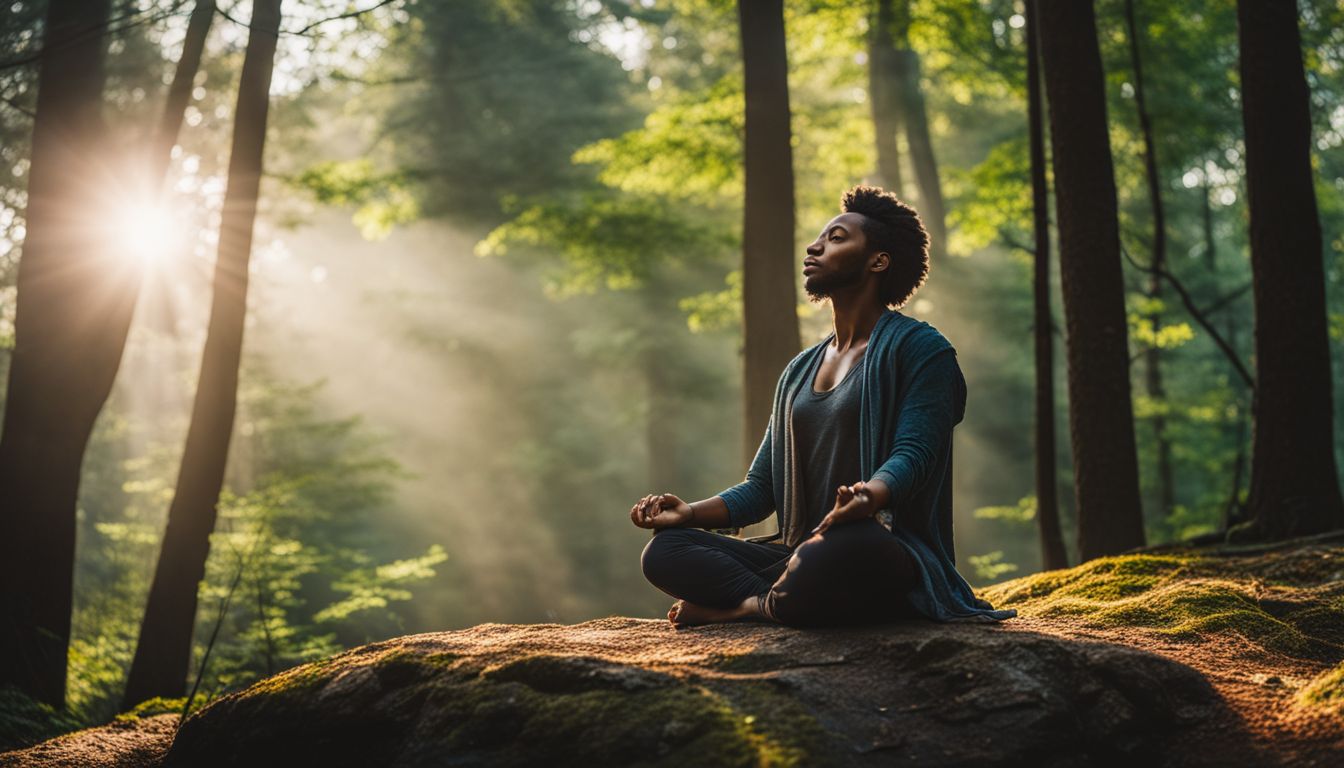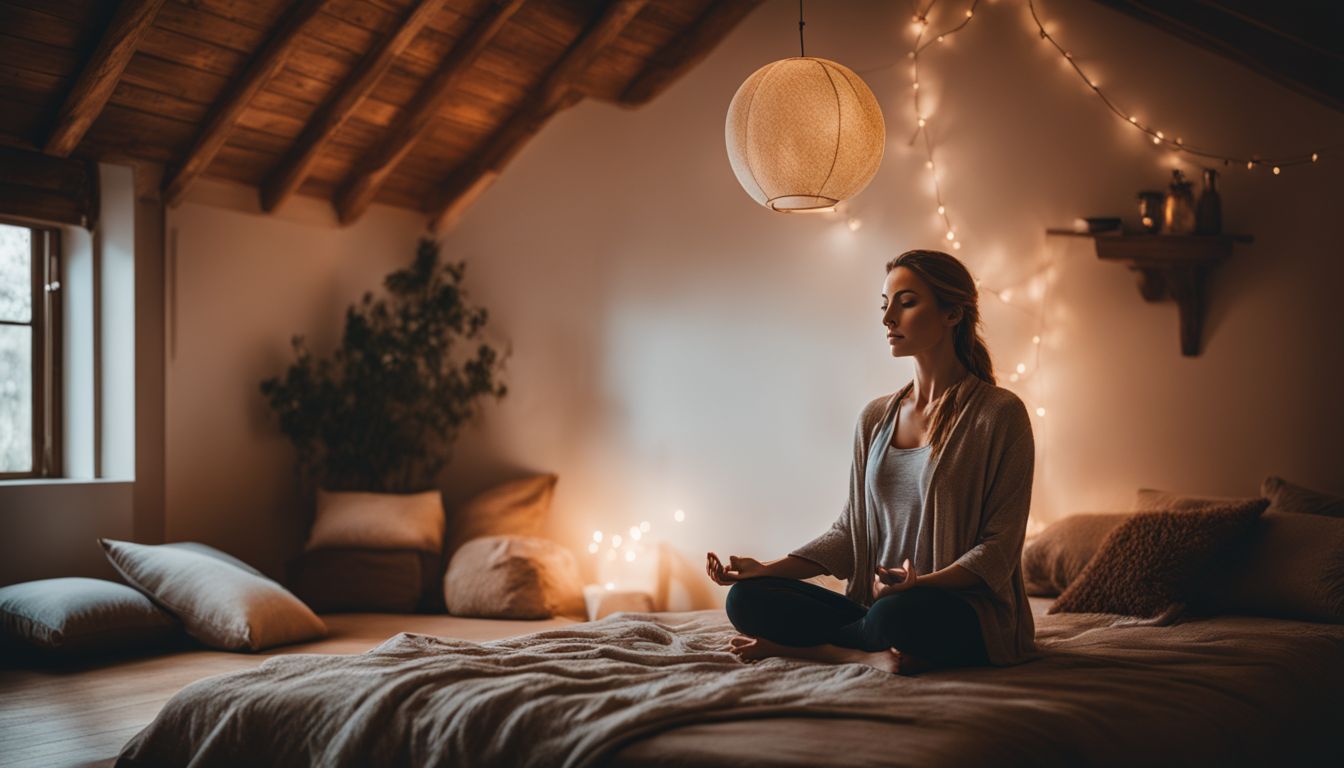5 Quick & Simple Mental Exercises To Try During Stressful Times
Feeling overwhelmed and stressed out? Studies have shown that over 70% of adults encounter daily stressors, affecting their mental and emotional wellbeing. This blog post outlines five simple yet effective mental exercises to help you conquer those stress-filled days by grounding yourself in calmness.
Ready to discover your new favorite relaxation technique? Let’s dive in!
Key Takeaways
- Deep breathing, progressive muscle relaxation, mindfulness meditation, visualization, and journaling are quick and simple mental exercises that can help relieve stress during challenging times.
- These exercises can reduce anxiety and tension, improve focus and concentration, enhance emotional well-being, increase self-awareness, and promote better sleep quality.
- To incorporate these mental exercises into your daily routine, set aside dedicated time each day for practice in a calm and comfortable environment. Use guided meditation apps or videos to help you. Experiment with different techniques to find what works best for you.
- Other stress-relief strategies include engaging in physical activity, practicing self-care activities, connecting with others, spending time in nature, and limiting screen time. Trying out multiple strategies can help you manage stress effectively.
Quick and Simple Mental Exercises for Stress Relief
Deep breathing, progressive muscle relaxation, mindfulness meditation, visualization, and journaling are all quick and simple mental exercises that can help to relieve stress during challenging times.
Deep Breathing
Deep breathing is a good way to calm down. It helps to slow your heart rate and lower stress. You take slow, deep breaths in this method. Your mind focuses on each breath you take in and out.
This slows down racing thoughts that can make you feel stressed or anxious. The key to deep breathing is feeling the air fill your lungs as you breathe in and then leave your body as you breathe out.
Progressive Muscle Relaxation
Progressive Muscle Relaxation is a simple and effective technique to relieve stress and tension. It involves tensing and then relaxing each muscle group in your body, one by one. By doing this, you can release built-up tension and promote relaxation throughout your body.
You can start by sitting or lying down in a comfortable position. Begin with your toes, tighten the muscles for a few seconds, and then relax them completely. Move up to your calves, thighs, stomach, chest, arms, shoulders, neck, and finally your face.
Take deep breaths as you do this exercise to enhance relaxation even further.
Research shows that Progressive Muscle Relaxation can help reduce anxiety levels and improve overall well-being. This technique helps increase self-awareness of tension held in different parts of the body and allows for it to be released consciously.
Mindfulness Meditation
Mindfulness meditation is a technique that can help reduce stress and improve overall well-being. It involves focusing your attention on the present moment, without judgment or attachment to thoughts or emotions.
This practice has been shown to have many benefits, such as reducing anxiety and improving emotional regulation. By regularly practicing mindfulness meditation, you can increase your self-awareness and cultivate a sense of calm and clarity in stressful times.
Visualization
One technique mentioned in the article is visualization, which involves using your imagination to create mental images that promote relaxation and reduce stress. By visualizing calming scenes or situations, you can help your mind and body relax.
This technique is effective because it engages your senses and helps shift your focus away from stressful thoughts or situations. For example, you can imagine yourself on a peaceful beach, feeling the warm sand beneath your feet and hearing the gentle sound of ocean waves.
Visualization can be done anywhere and at any time, making it a convenient tool for managing stress during challenging times.
Journaling
Journaling is another effective mental exercise for managing stress. It involves writing down your thoughts, feelings, and experiences. By putting your thoughts on paper, you can gain clarity and perspective on stressful situations.
Journaling also helps improve self-awareness and emotional well-being. You can start by simply writing about what is causing you stress and how it makes you feel. This process allows you to release negative emotions and explore possible solutions or different perspectives.
Regular journaling can be a valuable tool for reducing anxiety and improving overall mental health during stressful times.
Benefits of Mental Exercises for Stress Relief
Mental exercises for stress relief offer a range of benefits including reduced anxiety and tension, improved focus and concentration, enhanced emotional well-being, increased self-awareness, and better sleep quality.
Reduced anxiety and tension
One of the benefits of practicing mental exercises during stressful times is a reduction in anxiety and tension. These techniques, such as deep breathing and progressive muscle relaxation, help to calm the mind and relax the body.
By focusing on these exercises, individuals can alleviate feelings of stress and worry, allowing for a greater sense of peace and tranquility. So when you’re feeling overwhelmed or anxious, taking a few moments to engage in these simple mental exercises can help bring about a sense of calmness and relief.
Improved focus and concentration
One of the benefits of practicing mental exercises for stress relief is improved focus and concentration. When we are stressed, our minds tend to wander and our thoughts become scattered.
However, by engaging in techniques like deep breathing, progressive muscle relaxation, mindfulness meditation, visualization, and journaling, we can train our minds to stay present and focused on the task at hand.
These exercises help quiet the mind and reduce distractions, allowing us to concentrate better on what we need to do. With improved focus and concentration, we can be more productive and efficient in completing tasks while feeling calmer and more centered during stressful times.
Enhanced emotional well-being
Taking part in quick and simple mental exercises can greatly enhance our emotional well-being during stressful times. These exercises help us manage our emotions better, reduce feelings of anxiety and tension, and promote a sense of calmness.
By practicing techniques like deep breathing, mindfulness meditation, visualization, and journaling, we can develop greater self-awareness and gain control over our emotions. Engaging in these activities regularly can lead to improved emotional well-being overall.
Increased self-awareness
Increasing self-awareness is an important aspect of managing stress and improving mental health. By becoming more aware of our thoughts, emotions, and behaviors, we can better understand the triggers for our stress and develop healthier coping strategies.
Self-awareness allows us to recognize patterns in our thinking and behavior that may contribute to stress or anxiety. It also helps us identify negative thought patterns or beliefs that can be challenged and replaced with more positive and realistic ones.
With increased self-awareness, we are better equipped to make conscious choices about how we respond to stressful situations, leading to a greater sense of control over our own well-being.
Better sleep quality
Getting enough restful sleep is crucial for maintaining good mental health and managing stress. The article suggests that practicing mental exercises can help improve sleep quality.
By incorporating techniques like deep breathing, progressive muscle relaxation, mindfulness meditation, visualization, and journaling into your daily routine, you can promote relaxation and reduce anxiety before bedtime.
These exercises have been shown to calm the mind and prepare the body for a peaceful slumber. So if you’re looking to enhance your sleep quality during stressful times, give these simple mental exercises a try!
Incorporating Mental Exercises into Daily Routine
To incorporate mental exercises into your daily routine, set aside dedicated time each day to prioritize your mental well-being.
Set aside dedicated time
To practice mental exercises effectively, it’s important to set aside dedicated time each day. This means finding a specific time in your schedule where you can fully focus on these exercises without any distractions.
It could be in the morning before starting your day or in the evening before bed. By allocating this dedicated time, you are prioritizing your mental health and giving yourself the opportunity to relax and reduce stress.
Remember, even just a few minutes of mental exercise can make a difference in how you feel throughout the day. So find that dedicated time and commit to taking care of your mental wellbeing.
Create a calm and comfortable environment
To create a calm and comfortable environment, find a quiet space where you can relax without distractions. Clear the clutter and make sure the room is clean and organized. Use soft lighting or natural light to create a soothing atmosphere.
You can also add calming elements such as aromatherapy with essential oils or gentle background music. Find a comfortable chair or cushion to sit on, ensuring that your body feels supported and relaxed.
Creating this serene environment will help promote relaxation during your mental exercises for stress relief.
Remember, finding a calming space doesn’t always require a dedicated room or fancy equipment. It could be as simple as sitting in your favorite corner of the house or stepping outside into nature for some fresh air.
Use guided meditation apps or videos
To make it easier to practice meditation and relaxation techniques, you can use guided meditation apps or videos. These resources provide step-by-step instructions and soothing audio to help you focus and relax your mind.
You can easily find these apps or videos online or through app stores on your phone or tablet. They offer a variety of guided meditations tailored to different needs, such as stress relief, deep sleep, or anxiety reduction.
By using these tools, you can easily incorporate mindfulness and relaxation into your daily routine, even if you’re new to the practice.
Experiment with different techniques
Try out different techniques to find what works best for you. Everyone is unique, so what may work for someone else might not work for you. You can explore deep breathing, progressive muscle relaxation, mindfulness meditation, visualization, journaling, and more.
Don’t be afraid to try new things and see what helps you relax and reduce stress. Keep an open mind and remember that it’s all about finding what works best for your mental wellbeing during stressful times.
Other Stress-Relief Strategies
Explore additional strategies such as physical activity, self-care activities, connecting with others, time in nature, and limiting screen time. Discover new ways to manage stress and find peace in daily life.
Physical activity
Physical activity is an important component of managing stress and promoting mental well-being. Engaging in regular exercise can help reduce anxiety, improve mood, and increase overall well-being.
Whether it’s going for a walk, bike ride, or participating in a yoga class, physical activity releases endorphins that act as natural painkillers and boost your mood. It also helps to distract you from negative thoughts and allows you to focus on the present moment.
Additionally, physical activity can enhance self-esteem and body image, which are important factors in maintaining good mental health. So make sure to incorporate some form of exercise into your daily routine to reap the benefits for your mind as well as your body.
Self-care activities
Self-care activities are important for managing stress and promoting mental well-being. Here are some simple self-care activities to try during stressful times:
- Take a warm bath or shower to relax your body and mind.
- Engage in hobbies that bring you joy, such as reading, painting, or gardening.
- Practice gentle stretching or yoga to release tension in your muscles.
- Listen to calming music or nature sounds to soothe your mind.
- Treat yourself to a favorite snack or meal that brings you comfort.
- Spend time outdoors in nature, taking a walk or simply enjoying the fresh air.
- Write down your thoughts and feelings in a journal to express yourself and gain clarity.
- Get enough sleep and prioritize restful activities like reading before bedtime.
- Connect with loved ones through phone calls, video chats, or spending quality time together.
- Practice positive affirmations and gratitude by reminding yourself of your strengths and blessings.
Connecting with others
Connecting with others is an important aspect of maintaining good mental health and reducing stress. Social support can provide a sense of belonging, comfort, and understanding during challenging times.
It allows individuals to share their feelings, thoughts, and experiences with trusted friends or family members who can offer empathy and encouragement. Research shows that having strong social connections can promote emotional well-being and resilience in the face of stressors.
Whether it’s through phone calls, video chats, or in-person meetings (when possible), reaching out to loved ones can help alleviate feelings of loneliness and provide much-needed emotional support.
Time in nature
Spending time in nature is a great way to relax and calm the mind. Being surrounded by trees, fresh air, and natural beauty can help reduce stress and anxiety. Research has shown that spending time in nature can lower blood pressure, improve mood, and increase feelings of well-being.
Whether it’s going for a walk in the park, hiking in the mountains, or simply sitting by a lake, taking time to connect with nature can provide a sense of peace and tranquility. So next time you’re feeling stressed or overwhelmed, consider stepping outside and immersing yourself in the healing power of nature.
Limiting screen time
It’s important to limit our screen time, especially during stressful times. Spending too much time in front of screens can add to feelings of stress and overwhelm. It can also disrupt sleep patterns and negatively impact mental health.
Studies have shown that excessive screen time is linked to increased anxiety and depression symptoms. So, try to set boundaries around your screen use by scheduling regular breaks and incorporating other activities into your day that don’t involve screens.
This could be spending time outdoors, engaging in hobbies or physical exercise, or connecting with loved ones face-to-face. By limiting your screen time, you’ll give yourself a chance to recharge and reduce the potential negative effects on your mental wellbeing.
Conclusion
In conclusion, incorporating quick and simple mental exercises into your daily routine can greatly improve your ability to manage stress and anxiety. Techniques such as deep breathing, progressive muscle relaxation, mindfulness meditation, visualization, and journaling can help reduce tension, increase self-awareness, and enhance emotional well-being.
By setting aside dedicated time for these exercises and exploring different techniques that work for you, you can effectively alleviate stress and promote a healthier state of mind.
Remember to prioritize self-care activities, connect with others, spend time in nature, engage in physical activity, and limit screen time as additional strategies for stress relief.
Start practicing these techniques today to cultivate a calmer mind and a more resilient mindset during stressful times.
FAQs
1. How long do these quick and simple mental exercises take?
These quick and simple mental exercises can be completed in just a few minutes, making them perfect for stressful times when you may not have much time to spare.
2. Can I do these exercises anywhere?
Yes, you can do these exercises anywhere as they don’t require any special equipment or environment. You can practice them at home, in the office, or even while taking a break outdoors.
3. What are the benefits of doing these mental exercises during stressful times?
Doing these mental exercises during stressful times can help reduce anxiety, improve focus and concentration, promote relaxation and overall mental well-being.
4. Are these exercises suitable for everyone?
Yes, these quick and simple mental exercises are suitable for everyone regardless of age or fitness level. They are designed to be accessible to all individuals looking for stress relief techniques.






















